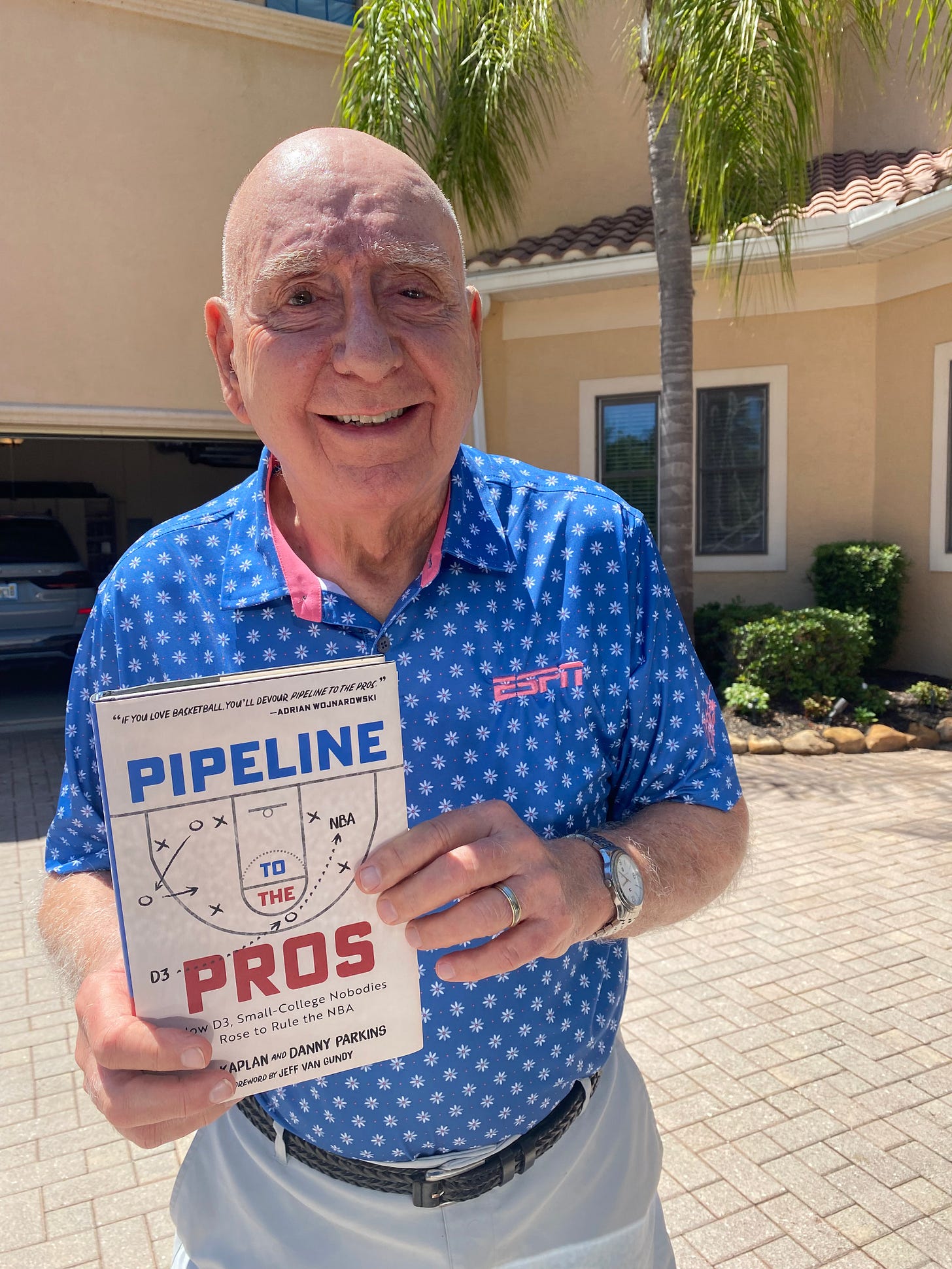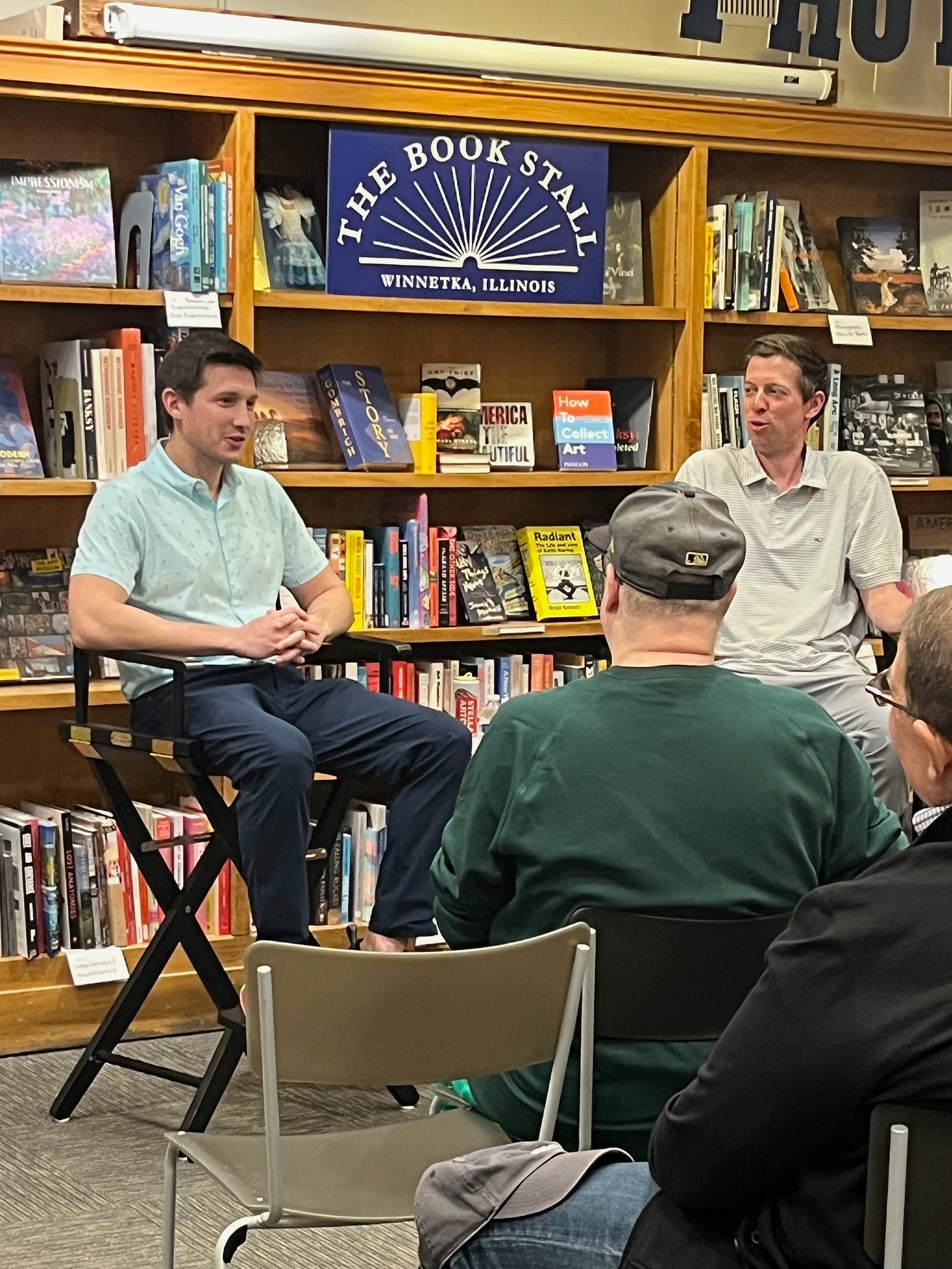Let me just start by saying: I promise this post will have a point beyond just being self-congratulatory, and that point will be relevant to anyone who has or is planning on attempting something difficult.
Today, April 16th, marks one year since the release of Pipeline to the Pros. Most big events in my life that have happened after Covid’s time-flattening effects feel like they were somehow both ages ago and also just yesterday. This book anniversary, though, only feels like it was ages ago.
With a full year between 4/16/24 (a day unlike any I’ve ever experienced) and today (a day that, besides the fact that I actually commuted into the city for work, is about the same as any other), it’s hard not to ask, “Was it all worth it?”
In a vacuum, my life hasn’t changed much. I still have the same job. My day-to-day existence of getting kids ready for school, working, making dinner, playing with kids, watching tv, going to bed is about the same now as it has been for the past few years. I would have a hard time with a rebuttal if someone were to say, “So you worked for hundreds of hours, got paid what would amount to a fraction of minimum wage, and ended up in the same place?” In fact, I said something similar to my wife the other night.
So forgive me for taking a victory lap here and celebrating the wins. What started with a few rough ideas and an irrational belief that I could research and write a sports book ended up as this:
What started as a phone call to my friend Danny ended up as a partnership that strengthened our bond and brought us closer together as we did our best to cope with some personal challenges.
I’ll never forget nervously pacing in my bedroom when Danny called to report back on whether or not Jeff Van Gundy agreed to write the forward (he did). Or sitting in the Miami airport on a layover, laughing and tearing up while transcribing Danny’s 150 minute phone call with Hubie Brown.
Or unlocking my phone and seeing the pictures below, which have me actively rooting against AI progress because pretty soon nobody is going to believe these are real (I barely do):
Or sitting with Danny during a Q&A and signing at our neighborhood indie book store, with plenty of friends and family in the audience.
Thanks to Danny’s media contacts, I experienced the surreal thrill of hearing our own book discussed on podcasts I actually listened to, like The Dan LeBatard Show and The Press Box with Bryan Curtis. Over a dozen podcasts even wanted to interview me, which was a ton of fun. The Chicago Tribune wrote a story about us, as did the local magazine Wilmette Living (which made for an embarrassing few days at school drop-off after the fact). Former Sports Illustrated writer Phil Taylor penned a positive review of the book in the Amherst College alumni magazine, which was quite the full circle moment—right after I graduated nearly 16 years ago, I spoke with Taylor over the phone and he advised that if I wanted to be a writer, maybe I should write a book. Took me long enough. I had viral tweets, picked up some followers on social media, and also made a stupid mistake posting something I shouldn’t have, resulting in a scolding from an NBA PR staffer (story for another time).
I discovered how addictive it is to check the mysterious Amazon rankings to try to track the book’s popularity. And also how fun it is to read reviews on Goodreads, even the bad ones (“I couldn’t believe this asshole gave us 3 stars, but then I saw that he panned Dune! This guy sucks!”)
Some favorite snippets from Goodreads and Amazon reviews (excluding the ones that are from people I know):
“Serves as a roadmap for kids who think they might want to work in pro ball without having played D1 or the NBA”
“Very insightful…tough to put down.”
“Cool to see how much work people are putting in to be able to work even entry-level jobs at the highest level, inspiring stuff.”
“Thoroughly researched and easy to read.”
“As someone who aspires to work in sports, it was unbelievable to gather the perspective and see the work ethic it takes to work in the NBA”
“Does an incredible job of melding countless D3 stories together…Felt like if Malcolm Gladwell wrote a sports book.”
“If you love the NBA or just basketball in general, this is a great book to pick up”
“Parkins and Kaplan, first and foremost, have something that many nonfiction sports texts lack: excellent prose”
But my absolute favorite Goodreads review was this one:
What is the biggest surprise of the past year? That apparently writing a book is like installing a bright light outside of your house, and the moths that it attracts are long-lost people from your past. The Goodreads review from my old next door neighbor was just the tip of the iceberg. Guys I played basketball with or worked with and hadn’t seen in years showed up to book events to say hello. Two of my karate teachers came to a reading, which is pretty wild given the fact that I hung up my gi almost 25 years ago. Through texts or social media, I heard from countless people who had drifted out of my life and are now back in it. I thought I was writing a book. Instead I was unknowingly casting a line. What a gift.
Those social connections were especially welcome after enduring the years of writing process. Writing a book, even when you do it with a friend, can be isolating. It is, unlike anything I’ve ever done before, a lonely pursuit. (Seriously, I can’t imagine what it would’ve been like working on this alone). While I’m fortunate to have these flashbulb moments of joy, and some other gratifying forms of external validation—it’s hard to imagine a bigger honor than the fact that the coach’s union purchased 40 signed copies of the book for all the coaches present at the D3 Final Four—ultimately what started with just me needed to end with just me.
The dopamine from retweets and the thrill from a text message or the high from a particularly witty podcast appearance wears off pretty quickly. It’s fairly common to hear people who achieve a major life goal talk about how they then slip into a funk. Now I, too, can echo their sentiment. You thought doing x, y, or z would solve all your problems. Of course, it doesn’t. In the end, you’re just back in the same office, sitting in front of the same glowing laptop.
That being said, it’s impossible to accomplish something like publishing a book, even a small one like ours, and not be transformed. It wasn’t the little bit of praise and microscopic bit of public attention that changed me. It was scaling the mountain of work and planting our flag at the top. The whole book journey starts and ends with the work. Looking back at all it took to produce those few hundred pages is both overwhelming and incredibly empowering. I have more belief in myself than ever before. It’s not because of a good review, or a few thousand book sales. It’s because I did a massive amount of challenging work. I set a stretch goal and finished the task. Oddly enough, I miss the feeling I got doing the work more than the feelings I got from anything positive that came as a result of the work.
Doing hard things may be unpleasant. The work may not result in fame or fortune. But, as long as you don’t cheat it, the work will always change you for the better. One of the greatest professional gifts is a challenging task and a talented teammate (or teammates) to work with. I was so lucky to have both. I can think of few pursuits more worthwhile than chasing after that high.








Great post. I’m working on my first book and it’s encouraging to hear how it feels at the end knowing how much work you put into it. I will try to enjoy the process!